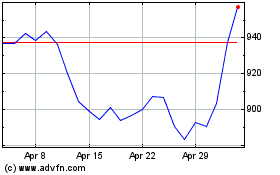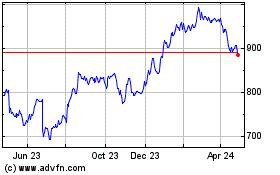By Joseph Walker
Late-night host Jimmy Kimmel wore a white lab coat and head
mirror strapped to his forehead on his talk show last month and
talked about Covid-19 vaccines that use messenger RNA. "This
technology could be a real game-changer," he says.
The skit was sponsored by vaccine maker Moderna Inc., one of a
number of direct-to-consumer advertisements paid for by
pharmaceutical companies aimed at hesitancy and lack of awareness
toward vaccines and drugs for Covid-19.
Vaccine maker Pfizer Inc. has made ads featuring people spending
time with loved ones that conclude by asking " Why will you get
vaccinated?" Regeneron Pharmaceuticals Inc., maker of a monoclonal
antibody drug treatment, recently began running ads on television,
radio and social media. Eli Lilly & Co., maker of a rival
antibody therapy, has ads on social media and search engines
targeted at people in areas with high infection rates.
Moderna's consumer outreach is primarily focused on digital
advertising, says the company, including the sponsorship of online
video discussions on a news website focused on historically Black
colleges and universities.
The advertising isn't typical for pharmaceutical companies.
Unlike most drug promotions, the ads aren't aimed at gaining a leg
up on competitors or boosting sales in the next quarter, the
companies said. The goal is to persuade Americans to use
potentially lifesaving products that are already bought and paid
for by the U.S. government and provided free to consumers.
The campaigns more closely resemble those for launches of new
drugs for diseases with few or subpar treatment options, such as
the unbranded disease-awareness campaigns that hepatitis C
drugmakers sponsored in the 2010s urging people to get tested for
the liver disease. Except that with Covid-19, the window for
reaching consumers is smaller, says Kristen Eisterhold, Eli Lilly
& Co.'s marketing director for Covid-19 antibody treatments,
because of the urgency to control the pandemic.
"Oftentimes in healthcare, it takes months, years, and sometimes
even decades to create awareness," says Ms. Eisterhold. "Our
challenge really was how do you as quickly as possible establish
broad awareness with healthcare providers and consumers that these
treatment options exist."
The ads don't mention products by name, in part because of
marketing restrictions imposed by the emergency-use authorizations
granted by the Food and Drug Administration. Instead, the ads refer
to broader categorizations such as "monoclonal antibodies" or "mRNA
vaccines."
Vaccine makers are trying to reach the roughly one-third of
Americans who are reluctant to get vaccinated, according to the
most recent opinion polling from the Kaiser Family Foundation. Some
15% of people polled by Kaiser in April said they want to "wait and
see" before being vaccinated, and 19% said they would definitely
not get vaccinated or would do so only if required.
Regeneron and Lilly say they are trying to raise awareness that
their drugs are available to recently diagnosed people at risk of
developing severe cases. In clinical trials, the drugs helped
reduce hospitalizations or death by 70% compared with placebos.
Since being authorized last November, however, the drugs have been
underused, partly because many patients and doctors don't know
about them, according to the companies.
Through early May, just 49% of the nearly one million antibody
doses made by Regeneron and Lilly have been used by patients,
according to a Department of Health and Human Services spokeswoman.
From last year through the first quarter of 2021, Lilly has
recorded $1.5 billion in U.S. sales from the drugs; Regeneron's
U.S. antibody revenue was $448 million over the same period.
Regeneron ran its first TV ad in late April just before the
Academy Awards broadcast on ABC. The 30-second spot features actors
repeating the phrase "monoclonal antibodies" in an attempt to
familiarize the public with a term that doesn't roll off the
tongue, and a narrator who says the drugs may help certain people
stay out of the hospital.
"It is a mouthful," says Maya Bermingham, Regeneron vice
president for public policy and government affairs. "And for the
average person, what they want to know is: 'Is there a treatment?
When do I get it?' "
Another Regeneron TV commercial urges patients diagnosed with
Covid-19 to call their doctors immediately to ask about monoclonal
antibodies if they are at high risk of severe disease.
Regeneron's campaign is scheduled to run through the end of the
second quarter and is targeting 19 markets including Atlanta,
Baltimore and Detroit, and expected to reach roughly 40% of the
U.S. population, a spokeswoman says.
Priya Nori, an infectious disease specialist in Bronx, N.Y.,
says she saw the Regeneron ad while watching the Oscars. She
thought the ads would be helpful in raising awareness but were
poorly timed because infection rates have fallen so much in recent
months.
"I was texting with my colleagues saying, 'This is really cool,
I just wish this commercial was not in April when things were
ramping down and lot of people had gotten their first vaccine
doses,'" says Dr. Nori, who oversees Covid-19 antibody drug
infusions for Montefiore Health System. "That commercial should've
come out in January, that would have helped us the most."
Regeneron has spent about $545,000 on national TV ads related to
Covid-19 and its commercial have been seen 142.5 million times,
according to iSpot.tv Inc., a TV ad-measurement firm. The company
declined to comment.
Moderna declined to comment on its advertising budget, but said
in its first-quarter financial statement that its spending on
marketing and other expenses increased by $10 million compared with
the year-earlier quarter.
Lilly and Pfizer declined to say how much they have spent on
Covid-19 advertising. One of Pfizer's commercials showing a baby
announcement as a reason to be vaccinated, iSpot said, was seen 8.3
million times and had $78,000 in national TV ad spend.
Write to Joseph Walker at joseph.walker@wsj.com
(END) Dow Jones Newswires
May 16, 2021 08:14 ET (12:14 GMT)
Copyright (c) 2021 Dow Jones & Company, Inc.
Regeneron Pharmaceuticals (NASDAQ:REGN)
Historical Stock Chart
From Aug 2024 to Sep 2024

Regeneron Pharmaceuticals (NASDAQ:REGN)
Historical Stock Chart
From Sep 2023 to Sep 2024
